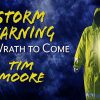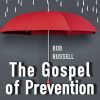What is the clearest sign that Jesus Christ is coming back soon? And, how can a Gentile witness to a Jew?
Tim Moore: Olivier Melnick of Chosen People Ministries has joined us to help answer those questions. Welcome, Olivier!
Olivier Melnick: End time events happening all around the world today are speeding up exponentially. I am tempted to design a T-shirt that says, “Normal is not coming back, but Jesus is!” Why? Because there is just so much happening.
From the perspective of a Messianic Jew, which I am, the Jewish people in Israel have seen a lot of Jewish people coming back to the Holy Land, though in unbelief (Isaiah 11:11-12). This is just one prophecy that is happening in our day and right in front of our eyes.
Nathan Jones: Israel provides us with what’s called “The Super Sign,” right? The Bible prophesies that when the Jews have been regathered back to their land and Israel is a nation once more then the return of the Messiah is soon to come to pass.
Olivier Melnick: Right. Jesus said that, exactly. Yes, today the Jews are going back to their land but in unbelief. This event also parallels the increase in Anti-Semitism. See? Satan knows what is happening. He’s the creator of Anti-Semitism. He knows that his days are numbered, so he’s going to do everything he can to go after the Jews. He also knows that if you go after the Jews and destroy them then they will not be able to call upon the One whom they have pierced crying out, “Baruch haba b’shem Adonai,” which is the event that brings back Yeshua — Jesus — and His Second Coming.
The Salvation of Leopold Cohn
Tim Moore: Obviously, Satan is going after the Jews but, Olivier, you are also going after the Jews as a Jew, but in a good way, right? You serve with Chosen People Ministries. What is their focus on reaching out to Jewish people?
Olivier Melnick: Chosen People Ministries was started in 1894, so clearly, I am not the founder. Our mission statement says that we exist to pray for, evangelize, disciple, and serve the Jewish community, as well as help others to do the same. So, that is basically what we have been doing for 128 years.
Nathan Jones: I heard there is a really interesting story about the founder of Chosen People Ministries?
Olivier Melnick: Yes, Leopold Cohn was a Hungarian rabbi. He was looking in the Scriptures and he stumbled upon some Messianic prophecies in Isaiah 53, Isaiah 9:6-7, and Isaiah 7:14. He went to his chief rabbi and he asked: “I am reading these scriptures in our Jewish Bible (the Old Testament) and it seems to be leading toward a redeemer like the Messiah. I wonder if you could help me understand this.”
Well, his rabbi got a little upset that he was looking at scriptures that were controversial to the Jewish people. So, he replied, “Do you know what? You are looking for the Messiah? Why don’t you go to America as they have everything over there.” Cohn took what his rabbi said at face value and so he got on a ship and a couple of weeks later he landed in Brooklyn (which, for the Jews, is like a holy land).
And so, Cohn is walking the streets of Brooklyn and he hears some talking coming out of a building with an open door. He did not know that it was a church. He hears a language he understands, not Hungarian but Yiddish, which is a Jewish dialect consisting of a mix of Hebrew and German. So, he thought that was interesting as he knew this language.
So, out of curiosity, Cohn walks in and sits in the back of the church. He is listening to this guy give a Bible study and talk about Jesus. He was very curious and he thinks, “This is interesting.” So, he keeps coming back, but quietly over a short period of time, listening from the back. Eventually, to make a long story short, Leopold Cohn found his Messiah. His rabbi was right after all. Cohn came to America and he did indeed find his Messiah.
Then, in 1894, Cohn founded in Brownsville, which is an area of Brooklyn, the Brownsville Mission. That eventually became the American Board of Missions to the Jews, or ABMJ, for many years, and then a few decades later it was renamed Chosen People Ministries.
How to Introduce a Jew to Jesus
Tim Moore: Olivier, you really do have a long heritage, not only in ministry but as a Jew. What would you recommend to us Gentiles who wish to be a conduit of blessing to the Jewish people? How do we reach out and share the Jewish Messiah with people who are Jewish and so will likely be resistant to hearing from a Gentile believer?
Nathan Jones: Should we not read Isaiah 53 to a Jew?
Olivier Melnick: Well, if you read Isaiah 53 to a Jewish person without telling them where it is from, you’ll get pushback. I’ve done it this way many times by asking, “I want to read something to you and I want you to listen to the words and tell me if it paints a picture of anything?” So, I read Isaiah 52:13-53:12, what we call Isaiah 53. I’ve read it to Jewish people and they respond, “I don’t believe in the New Testament and the story of Jesus; this is not for us.” But, I say, “What are you talking about?” They then respond: “Well, you are talking to me about Jesus dying and being crucified. It’s obvious that you are talking about Jesus here.” And I ask: “Are you sure? It’s actually in your Bible in the book of Isaiah.”
Sometimes they get upset with me, but the fact is that Jesus is right there in the Jewish Bible. Jesus’ death on the cross was prophesied 700 years before crucifixion even existed! Isaiah 53 provides a very powerful passage for reaching a Jew for Jesus.
Tim Moore: I’ve had the experience while I was riding on an airplane back and forth to Israel of being seated next to a Jewish person. One time there was an Orthodox man who was from Brooklyn who was studying some of his commentaries, as that is what they tend to study. I asked him, “What are you studying?” We got into a conversation as he was eager to converse, for it is a long flight. I finally asked him, “Have you ever read the book of Isaiah?” He replied, “No, not really.” And, this is a man who reads constantly. He told me he was always studying, but only the writings of the rabbis. I then asked him, “May I show you a passage in Isaiah?” It ends up he had never read Isaiah on his own. He recognized the passage, but he had never read the words as he only reads commentaries. It was soon very obvious that the rabbis had never commented on Isaiah 53.
Olivier Melnick: That is not uncommon. When you go to a church you can use a prayer book or a hymnal, and if you go to a synagogue, there is going to be a prayer book with prayers for different holidays and services. We divide the Torah into 54 weeks, that’s 52 weeks plus two extra, so 54 portions. We read them on Shabbat every weekend.
Once you get to Isaiah 52:12, the next passage is Isaiah 54:1. They do not include Isaiah 53. It’s as if it did not exist! So, the common Jewish person reading the passage for the week will not even know that Isaiah 52:13-53:12 exists. It’s not there for them. They don’t even know about it.
Religious Jewish people, a lot like the Jewish man you met on the plane, are probably only about 15% of the Jewish people in the world. They are going to be focusing on the Talmud, commentaries on the Bible, and a lot of the commentaries by Rabbi Rashi and Rabbi Ramban. They just don’t read the Word. It’d be like you and I reading the Ryrie Study Bible and we only read under the line — the commentary — and conclude that whatever Ryrie says is good enough for us. The Word of God is not that important because Ryrie knows better, so to speak.
Nathan Jones: I remember a young female friend of mine back when I lived in Philadelphia, which is a city that contains a very large Jewish population. A Messianic Jewish ministry gave me some materials in Russian, and because her family had immigrated from Russia, I gave those materials to her to read in the hopes that she’d find her Messiah. The next day she comes back and practically throws the newspaper in my face and declares, “My parents said to never read this. It’s taboo! We will never read this stuff. I don’t know what is in it, nevertheless, my parents wouldn’t let me read it.” It is so sad that the Messiah the Jewish people have been so long looking for is right there in Isaiah 53, but they won’t even read any materials about Him.
Olivier Melnick: I tell my Jewish friends, and anyone can do this, you say, “Listen, you don’t believe in a New Testament; you don’t believe it is inspired. Since you don’t believe in the New Testament, let’s put it aside. Let’s not even refer to it. Let’s not look at anything in the New Testament.” You start with that. You volunteer to do something first.
Then you say: “But, I don’t see the Talmud as being inspired. Sure, historically it is very valuable, but I don’t see it as being the Word of God. So, can we also put that aside? For the sake of the conversation, you and I are left with only one thing that we have in common — the Jewish Bible. So, now, let’s start with Genesis and go through all of the Messianic prophecies.” No Talmud, no New Testament.
Prophecy is what led me to Jesus 38 years ago. It is also important that you understand the history of the Jewish people. I tell Christians that when you go into a conversation with a Jewish person, you bring baggage. When I teach this I use a PowerPoint with a picture of a big suitcase and on it I put the stickers of different countries. I also put on stickers of the Crusades, the Inquisition, Martin Luther, the Black Plagues, and the Holocaust. As a Christian Gentile, you bring that suitcase into the conversation. You are already weighed down by that baggage. It exists, so you cannot dismiss it and you cannot dimmish that these events took place. The only thing you can do is open it beforehand and learn about what is inside the suitcase because your Jewish friend already knows about it. You cannot ignore it. Every Christian may not be Anti-Semitic, but every Christian because of the reputation that the Church and Christianity for the last 2,000 years have caused you to bring that baggage into any conversation you’ll have with a Jewish person, so be aware of it.






